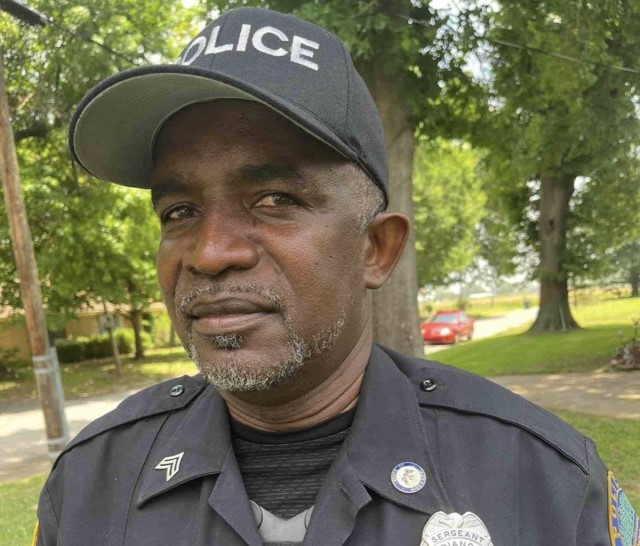Mississippi Today
Indianola police officer suspended in shooting of an 11-year-old faces second abuse-related lawsuit


An active duty Army staff sergeant is accusing an Indianola police officer already under investigation in a separate case of tasing him, choking him and pointing a gun at him while handcuffed in December 2022, according to a federal lawsuit filed last week.
Kelvin Franklin, 33, made the allegations against Officer Greg Capers, who has been suspended without pay and faces legal action in a separate incident: the May 2023 shooting of 11-year-old Aderrien Murry.
Carlos Moore is representing Franklin and the boy’s family in their respective lawsuits. In both interactions, the attorney said Capers escalated the situation. Capers’ alleged aggressive response came when Franklin arrived at his then-fiance’s house to retrieve a bag and after Aderrien called for help during a domestic situation.

“In both instances I believe both results would have been a lot safer if Greg Capers didn’t arrive at either scene,” Moore said.
Franklin’s lawsuit asks for a jury trial and for at least $500,000 to be awarded to cover compensatory and punitive damages, attorney fees and interest.
Cleveland attorney Michael Carr is representing Capers in proceedings for an aggravated assault charge the boy’s mother filed against the officer and in a $5 million federal lawsuit filed on Aderrien’s behalf.
Carr declined to comment Thursday because it was the first he had heard about Franklin’s lawsuit. He also doesn’t know if Capers has been served and is aware of the suit, which was filed Aug. 28.
The city of Indianola, Police Chief Ronald Sampson and five unnamed officers are also named as defendants. The lawsuit alleges Capers’ actions are the result of the city and police chief’s policy and failure to supervise and train officers.
The city defendants have not responded in writing to the lawsuit, and a representative from the police department did not respond to a request for comment Thursday.

The night of Dec. 30, 2022, Franklin was traveling home with his then-fiance’s cousin from Camp Shelby to his fiance’s residence in Indianola.
Once in Indianola, the lawsuit details how, as Franklin exited the car and went back to get a parking decal from inside the car, the fiance misread the situation and called 911.
Seeing the driveway was blocked, Moore said Franklin approached the cousin about moving their vehicle, and the fiance thought they were arguing. She called the police “out of an abundance of caution,” Moore said.
When Capers and the other officers arrived, Franklin told them he was there to retrieve a bag before returning to Camp Shelby, according to the lawsuit. He also said he had a firearm, which one of the unnamed officers took.
Capers pulled his gun on Franklin then put it back into the holster only to grab his taser, using it on Franklin up to four times and choking him, according to the lawsuit.
Franklin told the officers he was in pain and only had one kidney, but his request for medical attention was ignored and he was taken to the Sunflower County Jail, where paramedics evaluated him but didn’t treat him, according to the lawsuit.
When Franklin was released from jail a day later, he sought treatment at Forrest General Hospital in Hattiesburg because he was in pain and felt sick and weak, Moore said. Franklin had a dehydrated kidney and injuries to his neck, stomach and right hand, according to the lawsuit.
Moore said a bystander who knows Franklin filmed a portion of his encounter with police.
In the 3 ½-minute video shared with Mississippi Today, blue lights illuminate some of the darkness. Franklin is seen standing with his hands out to the side when an officer tases him. He bends over with a hand on his stomach and then falls to the ground. An officer starts to handcuff him.
The man filming makes several comments as the taser crackles and Franklin cries out.
“Put your hands behind your back, you’re fixing to get it again,” an officer says right before Franklin is tased.
The lawsuit alleges Capers acted suddenly when he drew his firearm and pointed it toward Franklin, who questioned the officer: “I haven’t done anything wrong for you to shoot me,” according to the suit. This moment was not captured on video.
Moore said body camera footage from the officers exists, and he plans to request it through discovery.
Franklin, who has been deployed in Kuwait since May, has over 16 years of military service, Moore said. Not only did the experience leave him mentally distraught and emotionally drained, but he worried about how the incident could have put his military career in jeopardy.
“It’s been an ordeal,” Moore said about how his client is doing.
This article first appeared on Mississippi Today and is republished here under a Creative Commons license.
Did you miss our previous article…
https://www.biloxinewsevents.com/?p=285948
Mississippi Today
On this day in 1977, Alex Haley awarded Pulitzer for ‘Roots’

April 19, 1977

Alex Haley was awarded a special Pulitzer Prize for “Roots,” which was also adapted for television.
Network executives worried that the depiction of the brutality of the slave experience might scare away viewers. Instead, 130 million Americans watched the epic miniseries, which meant that 85% of U.S. households watched the program.
The miniseries received 36 Emmy nominations and won nine. In 2016, the History Channel, Lifetime and A&E remade the miniseries, which won critical acclaim and received eight Emmy nominations.
This article first appeared on Mississippi Today and is republished here under a Creative Commons Attribution-NoDerivatives 4.0 International License.![]()
Mississippi Today
Speaker White wants Christmas tree projects bill included in special legislative session

House Speaker Jason White sent a terse letter to Lt. Gov. Delbert Hosemann on Thursday, saying House leaders are frustrated with Senate leaders refusing to discuss a “Christmas tree” bill spending millions on special projects across the state.
The letter signals the two Republican leaders remain far apart on setting an overall $7 billion state budget. Bickering between the GOP leaders led to a stalemate and lawmakers ending their regular 2025 session without setting a budget. Gov. Tate Reeves plans to call them back into special session before the new budget year starts July 1 to avoid a shutdown, but wants them to have a budget mostly worked out before he does so.
White’s letter to Hosemann, which contains words in all capital letters that are underlined and italicized, said that the House wants to spend cash reserves on projects for state agencies, local communities, universities, colleges, and the Mississippi Department of Transportation.
“We believe the Senate position to NOT fund any local infrastructure projects is unreasonable,” White wrote.
The speaker in his letter noted that he and Hosemann had a meeting with the governor on Tuesday. Reeves, according to the letter, advised the two legislative leaders that if they couldn’t reach an agreement on how to disburse the surplus money, referred to as capital expense money, they should not spend any of it on infrastructure.
A spokesperson for Hosemann said the lieutenant governor has not yet reviewed the letter, and he was out of the office on Thursday working with a state agency.
“He is attending Good Friday services today, and will address any correspondence after the celebration of Easter,” the spokesperson said.
Hosemann has recently said the Legislature should set an austere budget in light of federal spending cuts coming from the Trump administration, and because state lawmakers this year passed a measure to eliminate the state income tax, the source of nearly a third of the state’s operating revenue.
Lawmakers spend capital expense money for multiple purposes, but the bulk of it — typically $200 million to $400 million a year — goes toward local projects, known as the Christmas Tree bill. Lawmakers jockey for a share of the spending for their home districts, in a process that has been called a political spoils system — areas with the most powerful lawmakers often get the largest share, not areas with the most needs. Legislative leaders often use the projects bill as either a carrot or stick to garner votes from rank and file legislators on other issues.
A Mississippi Today investigation last year revealed House Ways and Means Chairman Trey Lamar, a Republican from Sentobia, has steered tens of millions of dollars in Christmas tree spending to his district, including money to rebuild a road that runs by his north Mississippi home, renovate a nearby private country club golf course and to rebuild a tiny cul-de-sac that runs by a home he has in Jackson.
There is little oversight on how these funds are spent, and there is no requirement that lawmakers disburse the money in an equal manner or based on communities’ needs.
In the past, lawmakers borrowed money for Christmas tree bills. But state coffers have been full in recent years largely from federal pandemic aid spending, so the state has been spending its excess cash. White in his letter said the state has “ample funds” for a special projects bill.
“We, in the House, would like to sit down and have an agreement with our Senate counterparts on state agency Capital Expenditure spending AND local projects spending,” White wrote. “It is extremely important to our agencies and local governments. The ball is in your court, and the House awaits your response.”
This article first appeared on Mississippi Today and is republished here under a Creative Commons Attribution-NoDerivatives 4.0 International License.
Mississippi Today
Advocate: Election is the chance for Jackson to finally launch in the spirit of Blue Origin

Editor’s note: This essay is part of Mississippi Today Ideas, a platform for thoughtful Mississippians to share fact-based ideas about our state’s past, present and future. You can read more about the section here.
As the world recently watched the successful return of Blue Origin’s historic all-women crew from space, Jackson stands grounded. The city is still grappling with problems that no rocket can solve.
But the spirit of that mission — unity, courage and collective effort — can be applied right here in our capital city. Instead of launching away, it is time to launch together toward a more just, functioning and thriving Jackson.
The upcoming mayoral runoff election on April 22 provides such an opportunity, not just for a new administration, but for a new mindset. This isn’t about endorsements. It’s about engagement.
It’s a moment for the people of Jackson and Hinds County to take a long, honest look at ourselves and ask if we have shown up for our city and worked with elected officials, instead of remaining at odds with them.
It is time to vote again — this time with deeper understanding and shared responsibility. Jackson is in crisis — and crisis won’t wait.
According to the U.S. Census projections, Jackson is the fastest-shrinking city in the United States, losing nearly 4,000 residents in a single year. That kind of loss isn’t just about numbers. It’s about hope, resources, and people’s decision to give up rather than dig in.
Add to that the long-standing issues: a crippled water system, public safety concerns, economic decline and a sense of division that often pits neighbor against neighbor, party against party and race against race.
Mayor Chokwe Antar Lumumba has led through these storms, facing criticism for his handling of the water crisis, staffing issues and infrastructure delays. But did officials from the city, the county and the state truly collaborate with him or did they stand at a distance, waiting to assign blame?
On the flip side, his runoff opponent, state Sen. John Horhn, who has served for more than three decades, is now seeking to lead the very city he has represented from the Capitol. Voters should examine his legislative record and ask whether he used his influence to help stabilize the administration or only to position himself for this moment.
Blaming politicians is easy. Building cities is hard. And yet that is exactly what’s needed. Jackson’s future will not be secured by a mayor alone. It will take so many of Jackson’s residents — voters, business owners, faith leaders, students, retirees, parents and young people — to move this city forward. That’s the liftoff we need.
It is time to imagine Jackson as a capital city where clean, safe drinking water flows to every home — not just after lawsuits or emergencies, but through proactive maintenance and funding from city, state and federal partnerships. The involvement of the U.S. Environmental Protection Agency in the effort to improve the water system gives the city leverage.
Public safety must be a guarantee and includes prevention, not just response, with funding for community-based violence interruption programs, trauma services, youth job programs and reentry support. Other cities have done this and it’s working.
Education and workforce development are real priorities, preparing young people not just for diplomas but for meaningful careers. That means investing in public schools and in partnerships with HBCUs, trade programs and businesses rooted right here.
Additionally, city services — from trash collection to pothole repair — must be reliable, transparent and equitable, regardless of zip code or income. Seamless governance is possible when everyone is at the table.
Yes, democracy works because people show up. Not just to vote once, but to attend city council meetings, serve on boards, hold leaders accountable and help shape decisions about where resources go.
This election isn’t just about who gets the title of mayor. It’s about whether Jackson gets another chance at becoming the capital city Mississippi deserves — a place that leads by example and doesn’t lag behind.
The successful Blue Origin mission didn’t happen by chance. It took coordinated effort, diverse expertise and belief in what was possible. The same is true for this city.
We are not launching into space. But we can launch a new era marked by cooperation over conflict, and by sustained civic action over short-term outrage.
On April 22, go vote. Vote not just for a person, but for a path forward because Jackson deserves liftoff. It starts with us.
Pauline Rogers is a longtime advocate for criminal justice reform and the founder of the RECH Foundation, an organization dedicated to supporting formerly incarcerated individuals as they reintegrate into society. She is a Transformative Justice Fellow through The OpEd Project Public Voices Fellowship.
This article first appeared on Mississippi Today and is republished here under a Creative Commons Attribution-NoDerivatives 4.0 International License.![]()
-

 Mississippi Today7 days ago
Mississippi Today7 days agoLawmakers used to fail passing a budget over policy disagreement. This year, they failed over childish bickering.
-

 Mississippi Today7 days ago
Mississippi Today7 days agoOn this day in 1873, La. courthouse scene of racial carnage
-

 Local News7 days ago
Local News7 days agoSouthern Miss Professor Inducted into U.S. Hydrographer Hall of Fame
-

 News from the South - Alabama News Feed5 days ago
News from the South - Alabama News Feed5 days agoFoley man wins Race to the Finish as Kyle Larson gets first win of 2025 Xfinity Series at Bristol
-

 News from the South - Alabama News Feed5 days ago
News from the South - Alabama News Feed5 days agoFederal appeals court upholds ruling against Alabama panhandling laws
-

 News from the South - Texas News Feed7 days ago
News from the South - Texas News Feed7 days ago1 dead after 7 people shot during large gathering at Crosby gas station, HCSO says
-

 News from the South - Florida News Feed6 days ago
News from the South - Florida News Feed6 days agoJacksonville University only school with 2 finalist teams in NASA’s 2025 Human Lander Challenge
-

 News from the South - Missouri News Feed7 days ago
News from the South - Missouri News Feed7 days agoInsects as food? ‘We are largely ignoring the largest group of organisms on earth’



















































